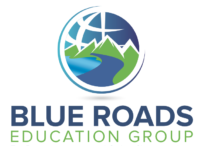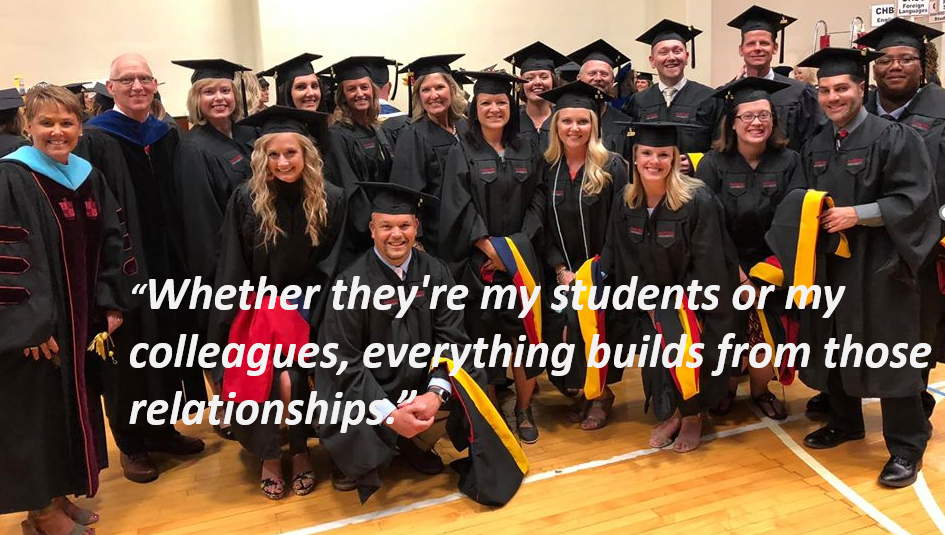I’ve had the honor of working with Brad Bizzell for over twenty years. We were principal colleagues together in Montgomery County, Virginia and later worked together in the Educational Leadership Program at Radford University preparing school leaders. I was grateful for this opportunity to sit down and learn about his Changemaker Journey using the “Homegrown Solutions for a Patchwork World” framework as our guide. I continue to learn so much from him about how to lead with your heart, as well as your mind, and how to bring out the best in people of all ages and stages of life. You will, too! Read, watch and listen!
HOMEGROWN BRAD
Brad grew up in North Carolina, the youngest of four children. His father was a teacher and school administrator and his mother was a homemaker.
“Education was something that was always highly valued in my family. Even though my grandparents did not have a lot of education, they valued education a great deal. Both my mom and my dad were the first in their families to go to college.”
Brad recalls three stories from his origins that have had a big impact on who he has become as an educator and leader.
The first is a story about his dad. In 1949, at the age of 14 and in the ninth grade, Brad’s father was ridiculed by his teacher in front of the class. He walked out of the school that day and never returned. Happily, though, he later worked to earn his GED (General Education Diploma) and joined the Army to serve in World War II before returning to go to college to become a teacher and, eventually, a high school principal. In fact, Brad’s dad served as the principal of the high school Brad attended.
The second story is about how Brad experienced difficulties as a middle schooler with a “speech impediment”. A wise teacher and coach noticed him struggling and asked him to manage the middle school basketball team. This was a turning point for Brad because it was in this context that he found a place to belong and begin to associate with the “cool kids”.
“Now, nearly 50 years later, I look back on junior high as my best K-12 years and, I owe that to Mr. Trogdon, a teacher who saw something that needed to be fixed and he fixed it.”
Brad grew to adulthood and got a business degree, but discovered he was pretty miserable in the business world until he recognized his true calling to be a teacher. After completing the requirements of a teaching license, he began teaching in the business department of a nearby high school. His third story begins during that time.
Here is that story in Brad’s own words:
“The last story is about a young man named Robert. Robert was one of my high school students. Robert had a pretty tough upbringing, struggled in school, struggled at home, lived with his dad, but basically was raising himself. Mom was kind of in and out of the picture occasionally…His junior year, he decided to go out for football and had never played football before but had some natural physical talent and went out and made the team.
Several weeks into the year, his mom called him and said, ‘I'm going to be coming to town and I'd love to spend the afternoon with you.’ So, he goes to his coach and says, ‘My mom's coming in town, I'm going to spend the afternoon with her. I might be a little bit late to practice.’. And the coach said, ‘If you're going to be late to practice, just turn in your gear.’
Robert turned in his gear and his mom never showed up.
That began a spiral. Robert dropped out of school about three weeks later. Every few days I'd give Robert a call and say, ‘It's not too late. You could get back in. We could catch you back up. You'd be ready to go. You could finish the year.’ Finally, he called me one Sunday afternoon and said, “I want to come back. What do I need to do?’ I said, ‘Show up Monday morning. We'll go to the guidance counselor. We’ll get your classes rescheduled. You'll be all set.'
So, Robert comes on Monday morning. We put him in the same classes he was in; same schedule. First period, he walks into his English class. The teacher turns around and looks at him and says (sarcastically),
‘Oh, great, Robert's back. That's going to help our test scores!’
Robert turns around, walks out of the building and never came back again. “
You may have noticed an important theme running through Brad’s “homegrown” stories. This theme is the key to his solutions.
SOLUTIONARY BRAD
Brad is a storyteller. He continues with his story about Robert.
“We've got a little silver lining though. Several years later …I was principal of an elementary school and one Monday morning, a young man, one of our third graders comes up to me and he says, “Do you remember Robert…? And he called his last name. I said, “Well, of course I do. How do you know Robert?” He goes, “He's my cousin. He came to visit us this weekend and he saw your name on something in my backpack. And he said to tell you that he had graduated from high school, moved to North Carolina, had a job and was doing great.”
As this anecdote illustrates, Brad’s stories always have a lesson and those lessons often connect to one guiding value of his life – the power of relationships. Brad learned important lessons from his dad’s story, his own experience in middle school, and his experience with Robert.
“Teaching matters…We have this power. We have this control and all of these things highlight the power of relationships.”
Teaching matters. Relationships matter. We can’t expect to hold onto our students long enough for them to graduate if they don’t have adults at school who genuinely care about them and help them find their place there.
“It shows teaching has the power to create pain in people and to comfort people. It can inspire people and it can stomp on their ideas.”
These stories are central to the reasons he wanted to be a teacher and central to his approach to problem solving and decision making. You don’t spend much time with Brad without hearing his comparison of real estate and education. The main thing in real estate is “location, location, location” while the main thing in education is “relationships, relationships, RELATIONSHIPS”. 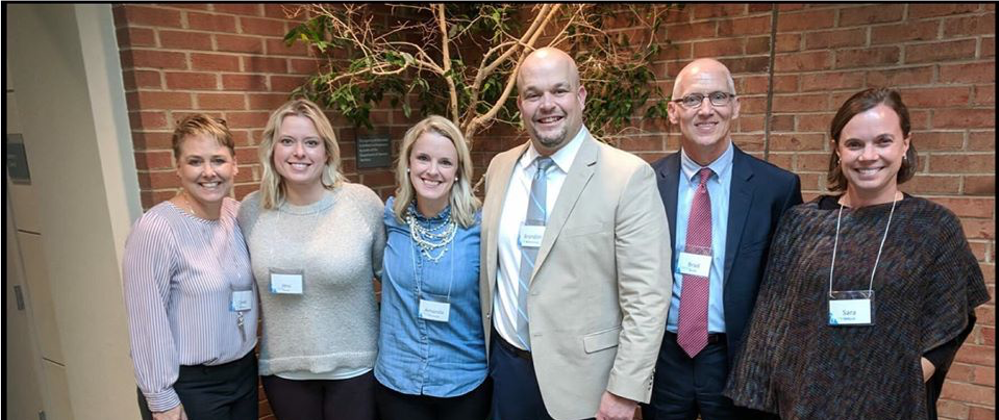
He’s right about that. He lives it, he models it, he preaches it and those around him reap the benefit of his efforts to treat each one as valued and important. Those of us who’ve been fortunate to work alongside him during his years as a teacher, principal, school improvement coordinate and university professor have witnessed and benefited from this firsthand.
“In every one of those positions, the first and foremost thing on my list is… those relationships with the folks I'm working with. Whether they're my students or my colleagues, everything builds from those relationships.”
He references Theodore Roosevelt’s words, “Nobody cares how much you know until they know how much you care.” Robert’s experiences, literally, drove him away from school. His mistreatment by unsympathetic teachers echoed closely what happened to Brad’s father more than forty years earlier. In contrast, Brad passes on what he learned from the far different message he got from Mr. Trogdon.
It is in this context and culture of caring that he is also able to show what he knows and what he and others can do to resolve big issues when everyone feels safe enough to share their own knowledge and utilize their skills to maximum capacity.
PATCHWORK BRAD 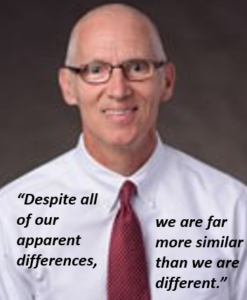
Though Brad acknowledges the value of the “patchwork of diversity” quadrant in the Blue Roads slogan, he makes a strong case for starting relationship work with what we have in common with those who may be different from us.
Brad practices what he preaches. Whenever he talks about diversity, he begins his comments by talking about commonalities and strengths and mentions specific differences and challenges as a distant second. He reminds us that it is in our common humanity that we develop the empathy needed to understand one another and to work productively across any differences that might unfold.
One theme in his work has been advocacy for students with special needs. When the special education law for public schools changed early in his career, students were taken out of segregated classrooms and moved into inclusive settings. General educators started being required to be a part of IEP teams. Brad’s experience as a parent gave him the perspective to help other educators better understand the law and the needs of students with special needs along with their families.
“My son, Erick, will be 30 years old in June. He is an amazing human being who brings joy to my life every day. He is a young man who loves to read. He loves YouTube videos. He loves bike rides and being in a car. There are so many things that he loves. He also is someone who experiences life with a fairly significant disability.”
Starting first with strengths and commonalities is central to Brad’s work with his students as well. He models and promotes curiosity as one of our most useful tools as leaders.
Often quoting from a video talk featuring Jeffrey Cufaude (found here: https://youtu.be/9KICv1Zy92k), Brad asks his graduate students to consider rethinking the emphasis placed when speaking the following words.
What were they thinking?!
What were they thinking?
What were they thinking?
Try it and you will see that one way of asking the question communicates frustration and judgment, while placing different emphasis on the same words illustrates genuine interest and curiosity about the thinking of another.
“Every time you look at something from a little different perspective, you can see something totally different.”
CHANGEMAKER BRAD
“My decision to become a school administrator was so that I could expand the influence that I do have to impact a broader group of people.”
Likewise, his work as a school improvement specialist and university professor have allowed his positive example to spread into a widening circle of influence. It’s difficult to calculate the number of students who’ve ultimately been affected by Brad’s consistent emphasis and practice of relationship building over his many years as an educator.
Like an expanding web of interconnectedness, every student he taught, every teacher, parent and child he worked with as a principal, every school in which he worked to facilitate improvement, every graduate student who learned from him to lead and influence their own constituents through relationships will remember his stories. They will remember how much he cared, and they will also remember how much he knows.
Brad’s humility and belief in leading alongside, rather than in front, prevents him from touting his own considerable capabilities. He prefers to recognize the wisdom of the group and facilitate collaborative processes that allow that wisdom to develop and shine. This has been his approach as a principal, as a school improvement specialist and as a professor developing future principals and, most recently, future superintendents.
“It’s not so much about content; it’s about facilitating experiences.”
His belief that the expertise needed to create a change exists in every leader and in every school, guides the way he works with any group of teachers and learners.
“I care about them and I want to help them learn and, to the extent possible, empower them with some tools where they can be the changemakers of their school divisions.”
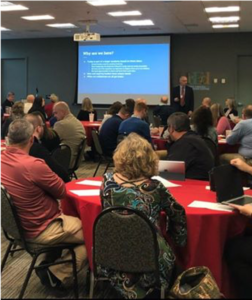
Brad also enjoys working with, and learning from, current school leaders whenever he can. He celebrates the great academic results achieved across Region VII of Virginia when school divisions in the southwest corner of the Commonwealth collaborated to pool knowledge, skills and resources. Going from some of the lowest performing schools in the State to the highest performing region overall is a testament to the same kind of collaborative work Brad teaches in his classes. He shares these examples with his students so they can see what can happen when people come together with processes that allow them the time and space needed to share what they already know in a way that benefits everyone.
Brad likes to say that when he was a new teacher, he knew everything there was to know about teaching, but now at 60, he knows “nothing”.
That kind of humility leaves him curious and always open to learning and growth. It also draws people to him because they know they will do some of the best work and learning of their lives in his presence.
In fact, we do care how much he knows precisely because he makes it abundantly clear how very much he cares.
Whether he names them or not, Dr. Bizzell is using his special brand of changemaking through relationship-building to help the world realize the Global Goals established by the United Nations in 2015. As you can see from his work, he is actively working on #4 Quality Education, #8 Decent Work and Economic Growth, #10 Reduced Inequalities, and #17 Partnerships for the Goals every day. You can learn about the goals (also called the Sustainable Development Goals) and think about how you are also working to reach them here: https://www.un.org/sustainabledevelopment/sustainable-development-goals/).
Podcast: Play in new window | Download
Subscribe: Spotify | iHeartRadio | Email | TuneIn | Deezer | RSS | More
